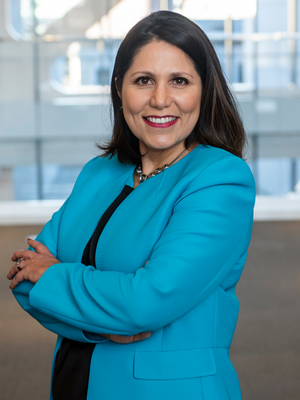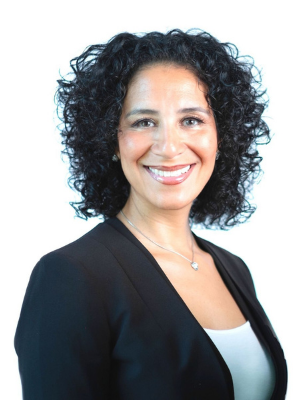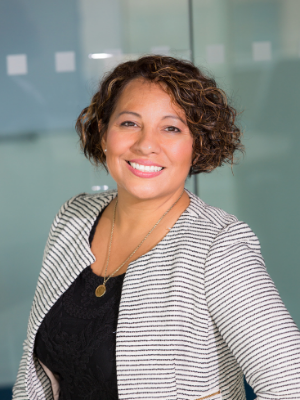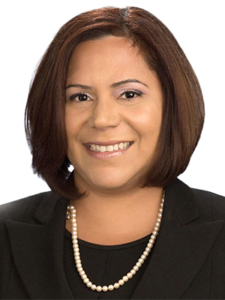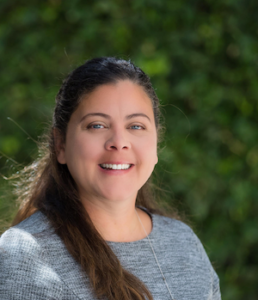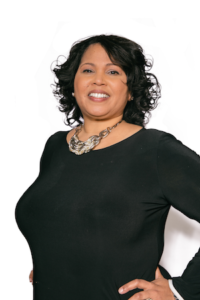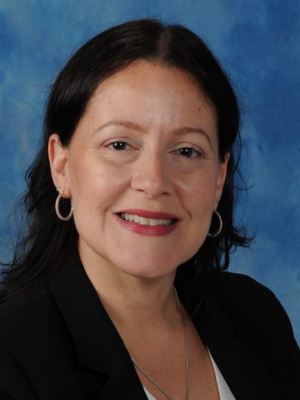 “I love to take the time to get to know individuals: to listen and to avoid assumptions,” says Vanessa Nazario. “I think that creates a space where people can be authentic, which leads to new conversations and new opportunities.”
“I love to take the time to get to know individuals: to listen and to avoid assumptions,” says Vanessa Nazario. “I think that creates a space where people can be authentic, which leads to new conversations and new opportunities.”
From housing to financial services to health, for 29 years, Nazario has been following the single thread of “creating access to spaces for those who have been historically left behind, underrepresented, marginalized, or alienated” – often including or focusing on the Hispanic community.
Following Inclusion Through a Career Pivot
Nazario’s journey began in her hometown of Trenton, New Jersey, supporting low to moderate income families to become first-time homebuyers. Nazario knew nothing about mortgages but was passionate about creating access to homes. Next, she found herself ensuring that low to moderate income families in urban communities had access to financial services and benefits while at PNC, where she worked her way up through positions for twenty years.
While ‘inclusion’ was not yet a hot topic in the office, her work was inclusion for customers and communities. Nominated to participate in the first Latino BRG at PNC, she knew little about employee networks, but she seized the opportunity to lean into her authentic self: “That experience opened my eyes to the power in using my Latina voice to be seen and heard in certain spaces where we were not represented before that. It became a gateway to inviting other Latina/o voices into the conversation and opening pathways for others.”
She eventually became Chapter President of the Latino BRG and began to be sought out as a thought leader. She attributes her C-suite position to valuing and showing up for this experience: “That’s why I’m a chief diversity officer now. Because I said ‘yes’ to being part of a newly formed diversity initiative at PNC.”
Then came the moment where Nazario decided that she wanted to make inclusion her full-time career. Not only did she go from programs and products management to DEI, but she simultaneously made a leap between industries. Leveraging her network, she landed a DEI director position within healthcare, later joined Memorial Healthcare System in 2021, becoming CDO in July.
“It was a big learning curve to go from financial lingo to healthcare lingo. It took time, but ultimately there’s a common thread across the different industries: it’s about creating equal spaces, access and equity for all – and it’s just how you approach it that differs. And once that clicked for me, I was like, I got this.”
Inclusion Through the Talent Pipeline
“Does your staff represent the community it serves? When you look at your community demographics, do you see that in the building?” asks Nazario. “How well is that mirrored not only in the services side of your organization, but across different departments and, especially, in leadership?”
She observes, “Sitting in South Florida, we’re blessed with an abundance of diversity, but that still doesn’t mean it happens organically. Your organization has to be committed to creating a diverse workforce.”
Much of Nazario’s strategic focus is on development and succession planning to elevate talent throughout the organization: “Rich in diversity, our work is making sure that diverse talent feels included and has a sense of belonging. When you have people from every walk of life, you’re going to have conflict. I spend a lot of time educating about the value of different cultures and different perspectives, as well as meeting people where they’re at.”
Nazario witnesses how having a staff that feels seen, heard, valued, included and therefore engaged positively impacts upon the patient experience: “In the healthcare sector, you have to be so attentive about making sure you are creating that sense of belonging and culture of inclusion. It’s so important that people feel they can bring their whole selves to work.”
Overcoming Imposter Syndrome
Nazario’s inquisitive mind, always questioning how things can be done better, has served her. Her passion and compassion for people is at the heart of how she approaches her work. Her drive and attentiveness is partly born from her own experiences as a Puerto Rican woman who has not always found it easy to come into new spaces.
“Being both a Hispanic woman and from a low-income community, I’ve combatted perceptions many times throughout my career,” says Nazario, but she feels she fell into traps around stereotypes more so early on: “I would show up to meetings and wonder, are they receiving me, or are they putting me into some box because I am a Puerto Rican woman from a diverse neighborhood?”
So Nazario has consistently exceeded performance expectations and countered the perceptions she felt others might box her into – demonstrating that being from a certain background does not mean you cannot also achieve.
Nazario has often not been able to see someone like her in positions she could aspire to. She values the mentors that encouraged her to envision herself there. “What are the chances of a Hispanic woman from an urban community like Trenton, New Jersey and from a culture not typically seen in these corporate spaces? I often think about stereotype threat, and maybe it would hold me back,” she reflects. “So, you need those mentors to say you’re doing all the right things and to nudge you in approaching opportunities.”
In a 360 review, Nazario once described herself as being a quieter voice, only to have her mentor immediately reflect that she was a powerful voice in the organization that was informative, impactful and influential in decisions: “Other’s perception of you is probably totally different than what you think.”
Beyond Proving Your Value, Claiming It
Nazario recognizes an inner push that exists within her, and not only her, to be very well versed in her craft and to continue to challenge and prove herself.
“I do have that hunger to continue to be successful and validate to myself that I can do it, that I can open doors. I might say ‘yes’ to a project when someone else might say ‘no,’” she says. “And as a Hispanic woman, I’m always thinking, maybe if I get another degree, one more certificate, that will open up more doors for me…I’ll be that much better, that much more qualified.”
While her drive has clearly served her, it is also growth when you no longer have to prove your worth and belonging in the face of imposter syndrome: “We just have to keep lifting each other up. Once you claim your value, it opens a lot of opportunities.”
She emphasizes to other Latinas coming in to own their voice at the table, and not hold themselves back, and she implores leaders to invite that opportunity in the room for diverse voices to express themselves.
Nazario loves reading as a way of constant learning. She has four dogs and feels fortunate to live near beaches, where she can mediate and listen to the waves every Saturday in a personal reset.
By Aimee Hansen

